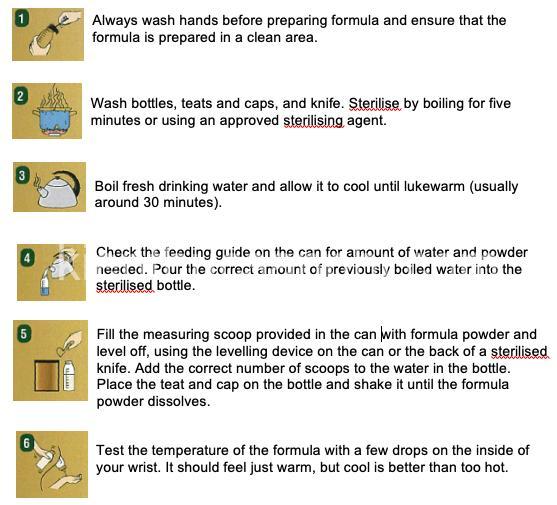
Should You Consult a Pediatrician Before Choosing Formula?. In today’s article, kienthucsannhi.com will explore with you in the most detailed and complete way. See now!
Why You Should Consult a Pediatrician Before Choosing Formula
Choosing the right formula for your baby is a critical decision, and consulting a pediatrician is the first step towards ensuring your baby gets the best nutrition possible. Every baby is different, and a pediatrician can help you understand your baby’s individual needs.
Pediatricians are trained to assess your baby’s specific needs, which may vary based on factors like age, weight, and potential allergies. For example, a premature baby may require a specialized formula, while a baby with a cow’s milk protein allergy will need a hypoallergenic formula. This individual assessment is crucial for providing your baby with the right nutrients for optimal growth and development.
A pediatrician can also guide you through the different types of formula available. There are many types of formula on the market, each with its own unique composition and intended for different needs. Your pediatrician can explain the differences between cow’s milk-based formula, soy-based formula, hypoallergenic formulas, and formulas designed for premature infants. They can help you choose the formula that best meets your baby’s needs and health conditions.
Furthermore, a pediatrician can help identify and address common formula-related issues. Babies can experience issues like allergies, constipation, and spitting up, which can be related to the formula they’re consuming. A pediatrician can help you recognize these signs, determine the cause, and recommend solutions to address them. They may also recommend adjusting the amount of formula, the frequency of feedings, or suggest alternative formulas to alleviate these issues.
Consulting a pediatrician provides peace of mind knowing you’re making the best possible choice for your baby. They can answer any questions you have, address your concerns, and ensure your baby receives the best possible care. By consulting a pediatrician, you’re equipping yourself with the knowledge and guidance to make informed decisions about your baby’s nutrition.

Benefits of Consulting a Pediatrician for Formula Choice
Consulting a pediatrician before choosing formula offers numerous benefits for your baby’s health and well-being. Here are some key advantages:
- Accurate Diagnosis: Your pediatrician can accurately diagnose any underlying health concerns that might influence formula choice. For example, if your baby has a milk protein allergy, they can recommend a hypoallergenic formula.
- Personalized Recommendations: Your pediatrician can provide personalized recommendations based on your baby’s specific needs and health history. This ensures they receive the right nutrients for optimal growth and development.
- Peace of Mind: Consulting a pediatrician provides reassurance and peace of mind knowing you have made the best choice for your baby. They can answer your questions, address your concerns, and provide support throughout your baby’s feeding journey.
When to Consult a Pediatrician About Formula
It’s always recommended to consult your pediatrician about formula before introducing it to your baby. Here are some specific instances when you should schedule an appointment:
- Before Choosing Formula: It’s best to consult your pediatrician before you begin shopping for formula. They can provide guidance on the best type of formula for your baby’s needs.
- After Formula Selection: Even after you’ve chosen a formula, regular check-ups with your pediatrician are essential. They can monitor your baby’s progress, address any concerns, and make adjustments to the formula as needed.
What to Ask Your Pediatrician About Formula
Consulting a pediatrician before choosing formula allows you to make informed decisions about your baby’s nutrition. Here are some important questions to ask your pediatrician:
What type of formula is best for my baby?
This will depend on your baby’s age, weight, and any specific needs or health concerns. For example, premature infants may need a specialized formula, while babies with allergies may require a hypoallergenic formula.
How much formula should I give my baby?
Your pediatrician can guide you on the appropriate amount of formula to feed your baby based on their age and weight.
How often should I feed my baby?
A pediatrician can provide you with a feeding schedule that meets your baby’s needs. This might include how many feedings per day and how much formula to give at each feeding.
What signs should I look for that my baby isn’t tolerating the formula well?
Your pediatrician can help you identify signs of intolerance, such as spitting up, diarrhea, constipation, fussiness, or skin rashes.
What are the potential side effects of different formulas?
Your pediatrician can explain the potential side effects of various formulas and help you weigh the risks and benefits of each option.
Choosing the Right Formula for Your Baby
Choosing the right formula for your baby is crucial for their health and development. Here’s a breakdown of different formula types and factors to consider when making your decision:
- Cow’s Milk-Based Formula: The most common type, this formula is usually a good choice for healthy infants. It contains essential nutrients and is typically well-tolerated.
- Soy-Based Formula: This formula is an alternative for babies with a cow’s milk protein allergy. It contains soy protein instead of cow’s milk protein.
- Hypoallergenic Formula: This formula is designed for babies with allergies to milk protein or soy protein. It contains hydrolyzed protein, which is easier for babies to digest.
- Premature Infant Formula: This formula is specifically designed for premature infants and contains higher levels of certain nutrients, such as protein and calories.
When choosing a formula for your baby, consider the following factors:
- Infant’s Age and Weight: The formula you choose should be appropriate for your baby’s age and weight.
- Potential Allergies or Sensitivities: If your baby has allergies or sensitivities, you’ll need to choose a formula that avoids those ingredients.
- Nutritional Needs: The formula should provide your baby with all the essential nutrients for healthy growth and development.
- Digestive Health: Some formulas are easier to digest than others, so you might need to choose a formula based on your baby’s digestive health.
Reading formula labels can help you understand the key ingredients and nutritional content. Look for formulas that meet your baby’s specific needs and are fortified with essential vitamins and minerals.
Transitioning to Formula
Introducing formula to your baby should be done gradually to avoid digestive upset. Here’s a general approach to transitioning to formula:
- Start Slowly: Begin by offering a small amount of formula, gradually increasing the amount over time.
- Observe for Intolerance: Watch for any signs of intolerance, such as spitting up, diarrhea, constipation, fussiness, or skin rashes.
- Seek Guidance from Your Pediatrician: If you have any concerns, consult your pediatrician for guidance.
Resources for Formula Information
If you have any questions or concerns about choosing the right formula for your baby, consult your pediatrician for personalized guidance. You can also find additional resources on the following websites:
- American Academy of Pediatrics: https://www.aap.org/
- World Health Organization: https://www.who.int/
Choosing the right formula for your baby is a crucial step in their development and well-being. By consulting your pediatrician and understanding the different formula types available, you can make an informed decision and ensure your baby receives the best possible nutrition.
Conclusion
Choosing the right formula can be a significant decision for new parents. Consulting a pediatrician is crucial to ensure your baby’s individual needs are met. With the right information and guidance, you can provide your baby with the best possible start in life. Share your experiences and questions in the comments below. You can also learn more about pet care by visiting kienthucsannhi.com.
EAVs (Entity – Attribute – Value):
- Pediatrician – Specialty – Pediatrics
- Pediatrician – Qualification – Medical Degree
- Formula – Type – Cow’s milk-based
- Formula – Type – Soy-based
- Formula – Type – Hypoallergenic
- Formula – Type – Premature infant
- Formula – Ingredient – Lactose
- Formula – Ingredient – Soy protein
- Formula – Ingredient – Hydrolyzed protein
- Infant – Age – Newborn
- Infant – Age – 0-6 months
- Infant – Age – 6-12 months
- Infant – Weight – Below average
- Infant – Weight – Average
- Infant – Weight – Above average
- Infant – Health – Healthy
- Infant – Health – Allergies
- Infant – Health – Constipation
- Infant – Health – Spitting up
- Infant – Health – Weight gain issues
ERE (Entity, Relation, Entity):
- Pediatrician, Provides advice, Formula
- Formula, Contains, Ingredients
- Infant, Needs, Nutrition
- Infant, May have, Allergies
- Infant, May experience, Constipation
- Infant, May experience, Spitting up
- Infant, Requires, Specific formula
- Formula, Affects, Infant growth
- Formula, May cause, Digestive issues
- Pediatrician, Diagnoses, Health concerns
- Pediatrician, Recommends, Formula type
- Formula, Contributes to, Infant development
- Infant, Has, Weight gain issues
- Infant, Experiences, Digestive problems
- Infant, Requires, Medical supervision
- Formula, Provides, Essential nutrients
- Infant, Benefits from, Proper nutrition
- Infant, Requires, Specialized care
- Pediatrician, Plays a role in, Infant health
- Formula, Impacts, Infant well-being
Semantic Triples (Subject, Predicate, Object):
- Pediatrician, is a specialist in, Pediatrics
- Formula, is a type of, Infant nutrition
- Infant, requires, Proper nutrition
- Infant, may experience, Digestive issues
- Formula, can cause, Allergies
- Formula, can be chosen based on, Infant’s needs
- Infant, may have, Weight gain issues
- Pediatrician, can provide, Personalized advice
- Formula, contains, Essential nutrients
- Infant, benefits from, Regular checkups
- Formula, can be purchased from, Stores
- Infant, requires, Medical attention
- Pediatrician, diagnoses, Health concerns
- Infant, may require, Specialized formula
- Formula, can affect, Infant’s growth
- Formula, can vary in, Ingredients
- Pediatrician, recommends, Formula type
- Infant, needs, Proper feeding schedule
- Formula, can provide, Complete nutrition
- Infant, requires, Constant monitoring







